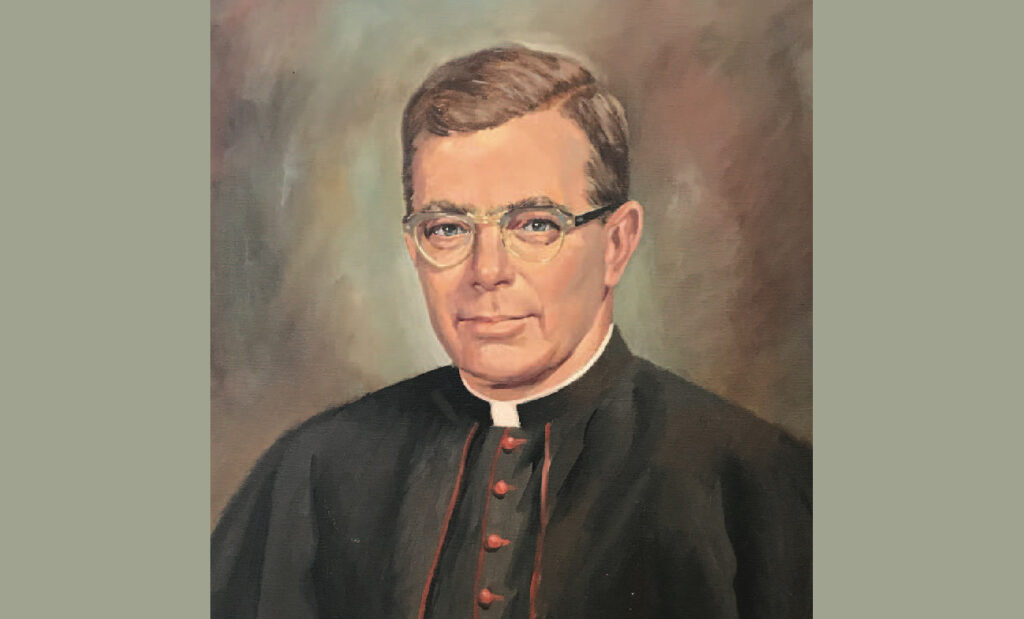BISHOP J. LOUIS FLAHERTY
GALLANTRY IN ACTION
When Father J. Louis Flaherty (1910– 1975), a priest of the Diocese of Richmond and Army chaplain, was awarded the Silver Star in 1945, Nov. 11 was still being observed as Armistice Day.
Catholics in Virginia largely responded to the call to service by fighting in their country’s wars: the Civil War (1861–1865), on the side of the Confederacy; World War I; World War II; the Korean War; as well as in the Vietnam War (1955–1973). In this way, Virginia’s Catholics proved their patriotism at a time when their allegiance was sometimes questioned.
Several priests of the Diocese of Richmond and those belonging to religious orders who worked in the diocese also served as military chaplains. During the Civil War, religious sisters cared for Union and Confederate victims. All of these actions helped to lessen anti-Catholic bigotry in Virginia, where, historically, Catholics have been a minority striving for acceptance.
Father Flaherty was one of six diocesan priests of Richmond, along with five religious priests in the diocese, who served as military chaplains during World War II. On the home front, priests involved with the diocesan mission band, the mobile chapel that traveled throughout Virginia evangelizing rural communities, suspended its activity in order to minister to soldiers at Camp Pickett in Blackstone.
Bishop Peter L. Ireton, then administrator of the diocese (1935–1945) and subsequently the ninth bishop of Richmond (1945–1958), personally assisted Amleto Cicognani, the apostolic delegate — the Vatican representative to the American hierarchy — in providing pastoral care to Italian prisoners of war interned at camps in Virginia. Richmond priests ministered similarly to German prisoners of war.
Lay people who were not fighting in the conflict also backed the war effort. They were involved in Catholic organizations that sponsored events for military service personnel and they participated in scrap drives.
Before his military service (1942–1946), newly ordained Father Flaherty was assigned as parochial vicar to St. Paul Parish and then to the Cathedral of the Sacred Heart in Richmond (1937). After leaving the Army, he received advanced education at The Catholic University of America (1946–1949) and was then assigned as parochial vicar to Blessed Sacrament, Norfolk (1949), where he had been baptized.
Flaherty was then appointed the diocesan superintendent of Catholic schools (1949–1959). His work included implementing the decision of Bishop Ireton to desegregate Catholic schools, which took place just weeks before the Supreme Court mandated the integration of the public- school system (Brown v. Board of Education, 1954). Bishop Ireton was the first Southern bishop to integrate Catholic schools.
Flaherty was named a papal chamberlain (1954), which included the use of the title “Very Reverend Monsignor,” and was assigned as pastor of St. Elizabeth Parish in Richmond (1959–1961). Monsignor Flaherty was also the founding pastor of St. Luke Parish in McLean (1961–1963) and was made a domestic prelate with the title “Right Reverend Monsignor.” It was during this postwar period that northern Virginia grew rapidly, owing to the expansion of the federal government, including the military.
After a stint as rector of St. John Vianney Minor Seminary in Richmond (1963–1965) and then as pastor of St. Andrew Parish, Roanoke (1965–1966), Father Flaherty was ordained an auxiliary bishop of the diocese in 1966 by John J. Russell, the 10th bishop of Richmond (1958– 1973). The diocese had been growing, and the presence of an auxiliary bishop, beginning in 1952 under Peter Ireton, was meant to assist the bishop in his task of governing.
Bishop Flaherty became rector of the Cathedral of the Sacred Heart following his episcopal ordination (1966–1967) and then pastor of St. Paul Parish, Richmond (1967–1971). His last assignment was as pastor of Blessed Sacrament Parish, Norfolk (1971–1975).
Then-Father Flaherty was awarded the Silver Star for his bravery during the Italian campaign of World War II. In a letter dated Jan. 1, 1945, he informed Bishop Ireton of the honor: “Enclosed is a copy of the citation that came with the Silver Star the C.G. [Commanding General] pinned on me this afternoon. The wounds referred to were just shrapnel scratches and left no scars.”
The Catholic Virginian (February 1945) featured excerpts from Father Flaherty’s letter to Bishop Ireton and included the following citation for the Silver Star awarded to him:
James L. Flaherty, 0477047, Captain, Chaplain’s Corps, United States Army. For gallantry in action on 10 October, 1944, in the vicinity of Gabbiano, Italy. Captain (Chaplain) Flaherty was visiting the companies of an armored infantry battalion while the battalion was in a forward assembly area prior to their taking over a sector on the front. While visiting the companies, they were subject to a sudden concentration of heavy artillery. Although wounded about his face and neck, Captain Flaherty, with complete disregard for his own safety and the continued enemy shelling, immediately helped to evacuate the wounded. He personally helped in placing the wounded in his peep [jeep] and driving them to the first aid station. He also rendered spiritual aid to the wounded and dying, regardless of denomination. The complete devotion to duty and disregard for his own personal welfare as shown by Captain Flaherty reflects the best traditions of the military service and is deserving of the highest praise.
M. W. Daniel,
Brigadier General, U.S. Army,
Commanding

